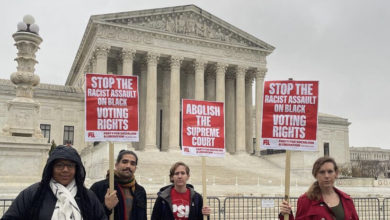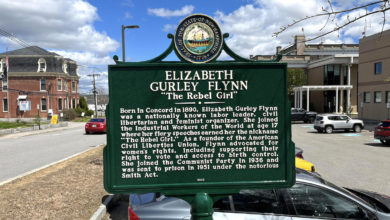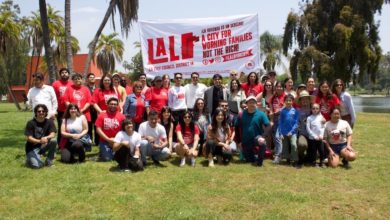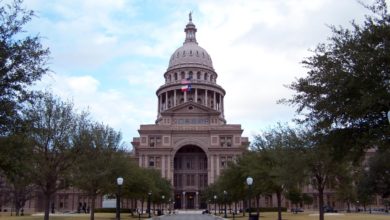The uncertainty in the chaotic race for the White House deepened after the votes were counted in New Hampshire. Bernie Sanders convincingly defeated Hillary Clinton, giving an expected but still important boost to his campaign. Trump’s victory was overwhelming, more than doubling the share of second place finisher John Kasich.
One of the many undemocratic features of elections in the United States is the outsized role of Iowa and New Hampshire, which represent a tiny and overwhelmingly white share of the U.S. population. Because they vote first, the results can have great impact on the momentum and viability of campaigns.
Big wins for Sanders, Trump
By more than 20 percent, Bernie Sanders scored a convincing victory over Hillary Clinton. From the mass rallies after his entry into the race, to the unprecedented influx of small donations, the virtual tie in Iowa and now the landslide in New Hampshire, there have been no signs that the Sanders campaign’s momentum will let up.
For a candidate to have gone from being considered non-serious to a real contender so explosively is testament to the depth and breadth of anger at Wall Street and the political establishment that exists in society. It also indicates serious weaknesses in the Clinton political machine, despite its vast network of contacts and lavish funding, including $21.4 million from the financial sector at the end of 2015. The Sanders campaign also had to contend with increasingly hostile coverage from major media outlets and the mobilization of the Democratic establishment in Clinton’s defense.
Sanders holds an enormous lead among youth, winning the support of 84 percent of those under the age of 30 and about three-quarters of voters under 45. Sanders was more popular among men, but still won a solid majority of women voters—55 percent. The only income category Clinton won was those making over $200,000, and Sanders was supported by 69 percent of those who self-identify as “falling behind financially.”
As expected, Donald Trump placed first in the Republican primary. This comes as a boost to his fascistic campaign after losing in Iowa, an uncomfortable reality for a demagogue who prides himself on always “winning” and despises “losers”. His share of the vote was 34 percent.
New Hampshire has a reputation for siding with the so-called moderates in the Republican Party, resistant to far-right upstarts who are often viewed with unease by the dominant sectors of capital. Donald Trump was able to succeed so convincingly because the establishment vote was split among a very large number of candidates—John Kasich, Jeb Bush, Chris Christie, Carley Fiorina and Marco Rubio.
It is much easier for a candidate to raise the money required to remain viable after the Citizens United Supreme Court decision, which effectively removed all limits on political donations. Individual or a small group of capitalists are now able to breathe life into pet campaigns that would have otherwise collapsed, prolonging the winnowing process that had almost always allowed the favored candidates of the Republican leadership to prevail (in New Hampshire and beyond).
Kasich came out on top of the fierce competition for the highly fractured base of support for the establishment faction of the Republican Party with 16 percent. Christie failed to break double digits, and Bush gained 11.1 percent and Rubio took 10.5 percent of the vote, not what either campaign was hoping for but not a devastating result either.
Ted Cruz finished third with 11.5 percent of the vote with two rivals very close behind. This is a disappointing, although expected, result for the winner of the Iowa caucuses. Trump and Cruz are both representative of a far right surge that is a tremendous danger to working and oppressed people.
With the implosion of Ben Carson’s campaign, Cruz has effectively become the candidate of evangelical Christians, who make up a disproportionately large share of the Iowa electorate but a relatively small number of New Hampshire voters. He has combined this with his rabidly pro-austerity Tea Party identity to create a coalition that is formidable in many parts of the country, but not in the Northeast.
Trump, vulgar, non-religious (despite his painfully transparent claims otherwise) and thrice-married, does not rely on support from evangelicals but rather voters who were previously disengaged from electoral politics. Feeling the sting of capitalist crisis or at least deeply insecure about their economic stability, Trump supporters are animated by extreme racism alone. Further, Trump is not tied to market fundamentalist ideology like Cruz and can make populist promises about massive infrastructure projects and universal healthcare.
Uncertainty set to continue
As the Party for Socialism and Liberation noted in its statement after the Iowa caucuses:
“[T]he fragmentation and division in the Republican and Democratic contests, with no clear front-runner, is likely to drag on through the majority of the nominating season.
“Secondly, the various candidates continue to attract distinctive sectors of the electorate and tendencies within the ruling class. In this sense, the internal unity of both parties is being severely tested.
“The ruling class generally displays a high level of class consciousness and unity, especially when in combat with poor and working people. That class of exploiters permits a certain degree of internal conflict to be expressed publicly, and utilizes the election season especially to allow social discontent to be vented safely and organized around different bourgeois trends.
“This election season, however, is somewhat different, allowing highly unconventional candidates to flourish, even threatening an “extreme” electoral outcome, to quote the alarmed Wall Street Journal editorial board.”
Under the weight of intractable economic and geopolitical crises, the U.S. political system is being stretched at the seams. Poor and working people will not find salvation in the electoral arena, but in a mass movement in the streets. The Party for Socialism and Liberation is running Gloria La Riva for President and Eugene Puryear for Vice-President to help build this fight-back and ultimately defeat the capitalist system, both its right wing zealots and liberal apologists.






